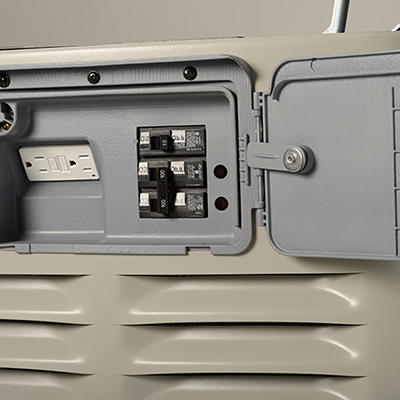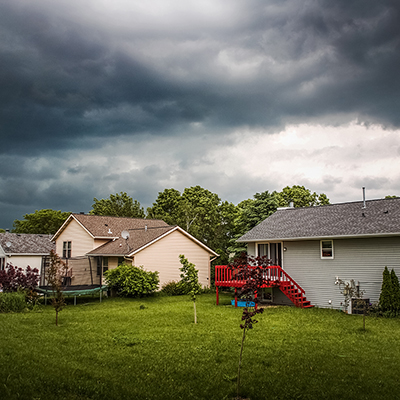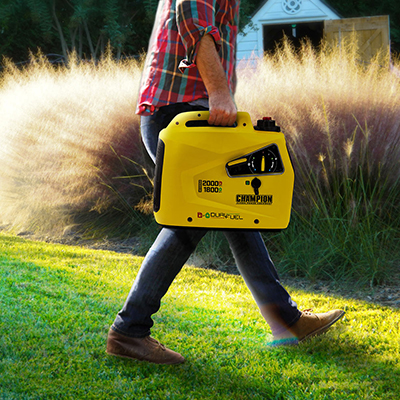Generator Buying Guide

Last updated June 21, 2024
A generator can keep your home or business running through a blackout or make it easier to power your grill at the big game. Finding the best generators for your needs starts with thinking about power output capabilities, fuel sources and the wattages required for appliances or tools. There are many types of generators to choose from. Whether you're looking for a 220-volt generator for camping, convenient battery generators or solar generators, this guide gives you the facts so you can select the best generator for you.
Table of Contents
What is a Generator?
How Much Generator Power Do You Need?
Best Generators for Home
Best Portable Generators
Best Inverter Generators
Types of Generator Fuel
What is a Generator?

A generator is a machine that turns mechanical energy into electrical energy. It provides electricity to devices and appliances when you are not connected to the power grid. Generators are important emergency safety equipment
during natural disasters
such as hurricanes and snowstorms, or during any power outage. Having the best generators for your home will allow you to keep
on lights, important appliances, essential medical equipment
and your home’s heat. If you live in an area that gets frequent but short outages, a generator can ease the inconvenience and ensure your day is never interrupted by an unexpected blackout.
Smaller generators are also useful for powering
RVs, boats and
workshops without electrical wiring. Keep a portable generator on hand for activities like tailgating and camping, when you may need to
power small appliances or charge devices.
How Much Generator Power Do You Need?

There are three basic types of generators: whole house generators, portable generators and inverter generators.
- Inverter generators are ideal for camping, boating and other recreational activities. They operate more quietly than other generators and provide power for lights, heaters, fans, radios, smart phones and more.
- Whole house generators (home standby generators) are the best generators for home use. They are designed to provide ample power for your appliances and HVAC systems.
- Portable generators are often used on job sites to power air compressors, nail guns, saws, hammer drills and other equipment. Most are loud, but there are quiet portable generators too.
Best Generators for Home

Whole house generators, or home standby generators, keep your home's systems and appliances powered up whenever you get separated from the power grid.
* Get automatic backup power in seconds during an outage with the best emergency generator for your needs.
- Whole house generators provide blackout protection seven days a week, 24-hours a day and are permanently installed.
- You can operate the machine using an existing fuel supply such as natural gas or liquid propane.
- Whole house generators are flexible enough to power your entire home or just supply power to a few designated circuits.
- When choosing the best generator for home backup, consider models with special features that run the unit more quietly or conduct weekly, self-diagnostic tests.
Best Portable Generators

Popular on job sites, portable generators provide limited power for small, short-term use. For greater efficiency and longer run time, choose auto-idle to idle the engine down when it's not in use.
Here are the approximate wattages of common tools:
- Chain Saw: 1000-1800W
- Circular Saw: 1200-1600W
- Drill (depends on size): 250-1200W
- String Trimmer: 600-1100W
- Hedge Clippers: 300-1000W
- Leaf Blower: 1000-1400
- Planer: 300-900W
- Sanders: 250-1500W
- Router: 100-1500W
- Shop Vacuum: 700-1400W
- Paint Sprayer: 500-1000W
- Miter Saw: 500-1000W
For more exact wattage amounts, see your specific tool manual.
Tip: The best portable generators for home use will have a 12-volt outlet that makes it easier to charge smart phones and other wireless devices.
Best Inverter Generators

Known for their lower noise levels, quiet inverter generators are lightweight and easy to transport. They use an engine connected to an alternator to produce AC power and convert it to DC power. DC power can be stored, which makes an inverter one of the best types of generators for traveling in an RV, tailgating, camping or boating.
Here are the approximate wattages for items commonly powered by an inverter generator:
- Lights: 250W
- Fan: 100W
- Space Heater: 1500W
- Hot Plate: 1200W
- Crock Pot: 1200W
- Television: 250W
For more exact wattage amounts, see your specific appliance manual.
Tip: You can usually connect two inverter generators together for twice the power.
Types of Generator Fuel

When choosing between types of generators, consider the types of fuel each generator will need. Fuel availability and storage are important factors when maintaining your generator. The generator’s fuel source should be affordable for you and on-hand whenever you need it. Below are the common types of generator fuel:
Gasoline:
- Readily available and easy to purchase, making it a good choice for portable generators.
- Available in 2- to 5-gallon portable cans.
- Lasts for 3 to 6 months when properly stored in an air-tight container.
- Lasts for up to 3 years when properly stored and combined with a fuel stabilizer.
- Gasoline generators should only be used outdoors.
Diesel:
- Offers the most energy per gallon of all generator fuel types.
- Reliable and readily available, making it a good choice for home standby generators or commercial generators.
- Diesel generators perform best when used for big jobs over long periods of time.
- Should only be used outdoors.
- Lasts for 6 months to 1 year when properly stored and without added stabilizers.
Natural gas:
- Most cost-effective and readily available fuels for home standby generators.
- Less energy-efficient per gallon than diesel, gasoline and propane.
- Delivered through natural gas pipelines, so refueling is not necessary. No storage required, making it the most convenient choice for residential and commercial generators.
- Should never be used indoors.
- Supply usually not affected by power outages.
Propane:
- Available as liquid propane or vapor propane.
- Liquid propane does not deteriorate, so it can be stored long-term.
- Clean burning.
- Should never be used indoors.
- Commonly used in inverter generators for RVs, campers and food trucks.
Dual fuel:
- Unique type of generator that can burn gasoline/diesel and has a natural gas hookup.
- Dual-fuel generators are not for use indoors.
- Not a standard type of generator, so not all manufacturers offer dual-fuel models.
- Clean, renewable energy for portable generators.
- Can often install more solar panels to increase power output.
- Can safely run indoors, as there are no emissions.
- Dependent on the sun for energy, so not always reliable in an emergency situation.
- Lower power output than other types of generators.
- Used in battery-powered inverter generators.
- Often combined with solar generators.
- Quiet and safe to run indoors.
- Often take a long time to charge and have a lower power output than other types of generators.
Key Features of the Best Generators

In addition to type, wattage, fuel type and purpose, consider these factors when choosing the best generators for home backup or for portable needs:
- Size: Make sure you have enough space to store both the generator and its fuel.
- Noise: Some generators, particularly diesel-fueled generators, run loudly and can be disruptive. Decide on your noise tolerance when choosing generators. Choose quiet generators if you need to be nearby it while it’s running.
- Price: Typically, the higher the power output, the more expensive a generator is. To save money on your purchase, find a generator that will supply just your basic necessities.
- Check how long the model will run on a full tank or full battery to determine its performance capabilities. This helps you choose the best emergency generator for the duration of your typical power outages.
- Extra features: Some generators have add-on features such as automatic starts, wheels for mobility on portable models, an economy mode, multiple outlets and more. You can also get generator accessories such as weatherproof storage covers and adapters, as well as handle and wheel installation kits.
Safety Tips for Generators

While generators are useful during power outages, natural disasters or when being used to provide power in remote locations, they also need to be handled properly to avoid any injuries or damage. Things to keep top of mind are:
- Purchase the right size generator or the best emergency generator for your needs.
- Keep the generator away from water.
- Always use the proper extension cords.
- Never operate the generator in an enclosed space, as it produces carbon monoxide, which can be harmful.
- Certain fuels can be a safety risk while in storage, and generator emissions can be toxic. Make sure the type of generator you choose is EPA-compliant for your area.
Follow the information on the chart above to ensure safety when using a generator.
To find the best generators for you, start by identifying the main purpose of your generator. From there, you can determine the necessary wattage and the fuel source that best works for you. You can rent a generator from your local Home Depot. Need to transport a generator you've purchased or rented to your home or job site? The Home Depot delivers online orders when and where you need them.
Related Products
Related Guides
Leave Your Next Project to Us
Professional Generator Installation
- Expert Generator Installers Do It For You
We hand-select licensed and insured generator contractors in your area who are known for their experience, knowledge, and superior service.
- How Our Generator Installation Service Works
Start with a free in-home consultation. Next, you’ll review product options with a local generator contractor vetted by The Home Depot. After your purchase, you can sit back and relax while you enjoy full-service installation of your new generator. Our generator pros can typically complete your installation in one day.
































